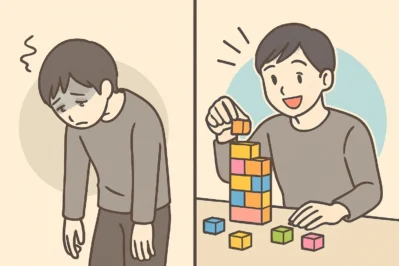From Burnout to “God-saeng”: Your Korean Guide to a Better Routine!
Hello! This is Maeil Hangul (매일한글), here to upgrade your Korean skills!
Do you ever feel tired, stressed, and overwhelmed? Like you have too much to do and not enough time for yourself? You’re not alone! Today, we’re going to learn some essential Korean expressions to talk about stress and, more importantly, how to build your own personal routine to prevent burnout.
Lately in Korea, especially among young people, there’s a huge trend called “갓생 (God-saeng)”. It means living a “God-tier life”—not by being perfect, but by building small, productive, and healthy habits every day. It’s all about taking control of your life and well-being. So, let’s learn how you can start living your own “God-saeng” with these useful Korean phrases!
Core Expressions You Need to Know
Here are three key expressions to help you talk about your new routine and well-being.
1. 나만의 루틴을 만들다 (Naman-ui rutin-eul mandeulda)
- Pronunciation [Romanized]: Naman-ui rutin-eul mandeulda
- English Meaning: To create my own routine.
- Detailed Explanation: This phrase is your starting point for a “God-saeng” life!
- 나만 (naman) means “only me,” and adding 의 (ui) makes it possessive, creating the nuance of “my very own” or “unique to me.”
- 루틴 (rutin) is a loanword from the English “routine.”
- 만들다 (mandeulda) means “to make” or “to create.”
This expression emphasizes personalization and taking proactive steps to design a life that works for you.
- 💡 Pronunciation Tip:
The pronunciation of 만들다 (mandeulda) can be tricky. When you conjugate it to the polite form, 만들어요 (mandeureoyo), the ‘ㄹ’ (l/r) sound at the bottom of 만들 (mandeul) connects to the next syllable. Many Koreans also drop the ‘으’ (eu) vowel in casual speech, making it sound more like [만드러요 / mandeureoyo]. This is a common vowel reduction that makes your speech sound much more natural!
2. 번아웃이 오다 (Beonaus-i oda)
- Pronunciation [Romanized]: Beonaus-i oda
- English Meaning: To experience burnout (literally, “for burnout to come”).
- Detailed Explanation: This is a very common way to talk about feeling emotionally and physically exhausted.
- 번아웃 (beonaut) is another loanword, from “burnout.”
- The interesting part is the verb 오다 (oda), which means “to come.” In Korean, you don’t are burned out; burnout comes to you, like an unwelcome visitor. This expresses the feeling that it’s an external force affecting you.
- 💡 Pronunciation Tip:
This is a perfect example of a Korean pronunciation rule called linking sound (연음 – yeoneum). The word is written as ‘번아웃 + 이’, but you don’t pronounce it asbeona-ut-i. The final consonant ‘ㅌ(t)’ from 아웃 (aut) moves over to the next empty syllable starting with ‘이(i)’. The ‘ㅌ(t)’ sound then softens to a ‘ㅅ(s)’ or ‘ㅊ(ch)’ sound before ‘i’, resulting in [버나우시 / beonausi]. So, you say it as one smooth word:beonausi.
3. 스스로를 챙기다 (Seuseuro-reul chaenggida)
- Pronunciation [Romanized]: Seuseuro-reul chaenggida
- English Meaning: To take care of oneself.
- Detailed Explanation: This phrase is the heart of self-care.
- 스스로 (seuseuro) means “oneself” or “by oneself.”
- 챙기다 (chaenggida) is a wonderfully versatile verb. It means more than just “to take care of”; it also means “to pack (for a trip),” “to not forget something,” or “to look after someone/something.” In this context, it implies being mindful and proactive about your own well-being—making sure you eat well, get enough sleep, and look after your mental health.
- 💡 Pronunciation Tip:
Pay attention to the first syllable, 스 (seu). The ‘ㅆ’ (ss) is a tensed consonant. To make this sound, tighten the back of your tongue and push out the air without any aspiration (puff of air). It’s stronger and higher-pitched than the regular ‘ㅅ’ (s). Think of the “ss” in “hiss” but with more tension. Practice saying “스스로” with a strong start!
Example Dialogue
Let’s see how these expressions are used in a real conversation between two friends, Minjun and Sora.
A: 민준 (Minjun)
소라야, 나 요즘 너무 피곤하고 힘들어. 진짜 번아웃이 오는 것 같아.
Soraya, na yojeum neomu pigonhago himdeureo. Jinjja beonaus-i oneun geot gata.
(Sora, I’m so tired and struggling these days. I think I’m really getting burned out.)
B: 소라 (Sora)
어떡해, 민준아. 그럴수록 스스로를 챙겨야 해. 일도 중요하지만 건강이 먼저지.
Eotteokae, Minjuna. Geureolsurok seuseuro-reul chaenggyeoya hae. Ildo jung-yohajiman geon-gang-i meonjeoji.
(Oh no, Minjun. In times like this, you have to take care of yourself. Work is important, but your health comes first.)
A: 민준 (Minjun)
맞아. 아침에 30분 일찍 일어나서 운동하는 나만의 루틴을 만들어 볼까 봐.
Maja. Achim-e 30bun iljjik ireonaseo undonghaneun naman-ui rutin-eul mandeureo bolkka bwa.
(You’re right. I think I’ll try to create my own routine of waking up 30 minutes earlier to exercise.)
B: 소라 (Sora)
좋은 생각이야! 그게 바로 ‘갓생’의 시작이지!
Joeun saenggagiya! Geuge baro ‘gatsaeng’-ui sijagiji!
(That’s a great idea! That’s the beginning of a ‘God-saeng’ life!)
Culture Tip: Deeper into “갓생 (God-saeng)”
So, what exactly is this 갓생 (God-saeng) trend?
It’s a combination of the English word “God” (갓) and the Korean word for life, 인생 (insaeng). It means living a “god-tier,” exemplary life. But it’s not about being rich or famous. For the Korean Z generation, “갓생” is a way to fight feelings of helplessness and burnout by focusing on small, achievable daily goals.
On social media like Instagram and YouTube, you’ll see thousands of posts with the hashtag #갓생. People share their “Miracle Morning” routines (waking up at 5 a.m.), study logs, workout progress, and healthy meals.
The key takeaway is that “갓생” isn’t about perfection; it’s about consistency and self-improvement. By creating your own routine (나만의 루틴을 만들다) and taking care of yourself (스스로를 챙기다), you are actively living a “갓생” and protecting yourself from burnout (번아웃). It’s a modern Korean approach to mindfulness and personal growth!
Let’s Practice!
Time to check what you’ve learned!
1. Fill in the blank:
요즘 일이 너무 많고 스트레스를 받아서 ________ 것 같아요. 쉬어야겠어요.
(I have so much work and stress these days, I think I’m ________. I need to rest.)Answer: 번아웃이 오는 (beonaus-i oneun)
2. Your Turn!
What is one small thing you want to do to take care of yourself? Using the grammar we learned, try to make a sentence!
Example: 저는 제 스스로를 챙기기 위해 매일 책을 읽을 거예요. (To take care of myself, I’m going to read a book every day.)
You did an amazing job today! Building a new routine takes time, just like learning a new language. Be patient with yourself and celebrate the small wins.
Now it’s your turn! Share your “God-saeng” goals in the comments using the expressions we learned today! We’d love to hear about them. 화이팅! (Fighting!)






